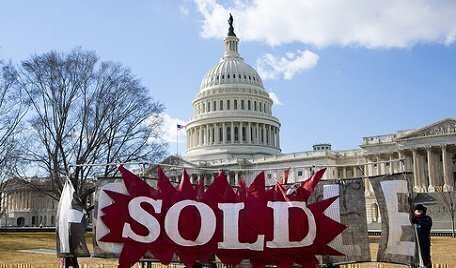In 2010, the Supreme Court ruled in Citizens United v. FEC. In what has become one of the most controversial decisions in recent memory, the Court, by a 5-4 majority, sided with the conservative non-profit organization, Citizens United. The ruling said that restrictions on monetary contributions to independent political organizations by corporations and labor unions were infringements on the Free Speech Clause of the First Amendment. Because such organizations neither donate funds to nor work directly with candidates or political parties, the Court reasoned, their communications are protected political speech.

Protesters against Citizens United gather at the Capitol on Jan. 21 last year. Photo via Public Citizen/Flickr.
The debate over Citizens United is not just about limiting political speech or corruption, but also whether corporations are “artificial legal constructs that are not entitled to First Amendment rights” or “legitimate participants in public debate.”
Those who oppose the decision argue that Citizens United gives a stronger voice to corporations and lobbyist groups, which undermines democracy. However, others hold that campaign finance laws that limit independent political contributions are blatantly limiting free speech. The American Civil Liberties Union has pointed out that money always makes its way into elections, regardless of campaign finance laws. In addition, the ACLU has highlighted the fact that super PACs that “emerged in the 2012 election cycle [were] funded with a significant amount of money from individuals, not corporations.”
This year, another lawsuit could further reshape the world of campaign finance.
The Republican Party of Louisiana has been fighting to end restrictions on “soft money” political donations. Soft money refers to money raised that is used for “general political activities,” not for a “particular candidate,” and is thereby exempt from caps on direct donations. These limitations have been in place since the Bipartisan Campaign Reform Act of 2002 (BCRA), also known as the McCain-Feingold Act, was signed into law. But in Republican Party of Louisiana v. FEC, the Party argues that federal law that restricts soft money contributions to local and state parties has no significant justification and is therefore a violation of the First Amendment.
The lead attorney in the case, James Bopp, “has spearheaded dozens of court challenges to federal and state rules nationwide on behalf of Republicans and conservative groups.” The legal team representing the Republican Party of Louisiana argues that while the BCRA is not necessarily unconstitutional on its face, the way the soft money ban has been applied is. Additionally, Bopp claims that the law “leaves political parties at a disadvantage to the super PACs.”
Courts have held for the past 40 years that limiting political contributions is a reasonable mechanism for reducing corruption. After the passage of the BCRA, the courts upheld the law in McConnell v. FEC (2003). With Citizens United, the Supreme Court narrowed the definition of corruption and reduced the BCRA’s role in curbing said corruption.
The U.S. District Court for the District of Columbia ruled to uphold the soft money restrictions under McConnell v. FEC. But with a direct appeal available, this case is likely headed to the Supreme Court.
With the Court evenly split along ideological lines since the death of Justice Antony Scalia, a decision would most likely not obtain a majority, leaving the lower court ruling in place. However, with the election of Donald Trump and Republican control of the Senate, a Supreme Court Justice will likely be nominated and approved in early 2017. As a result, the Court would likely rule 5-4 in favor of the Republican Party of Louisiana.
Those who are opposed to both the Citizens United ruling and this new case to end restrictions on soft money fear that the United States is entering a new age of heightened corruption. In addition, they fear that foreign actors, whether they are individuals, corporations, or governments may be able to play a greater role in the outcome of elections. Indeed, an amicus brief written by three non-profit organizations claims that “Louisiana Republicans’ arguments would have extraordinary and far-reaching negative consequences.”
However, the First Amendment protects political speech, including the money used to finance that speech. How the Supreme Court will balance these concerns in light of McConnell and Citizens United remains to be seen.
Maggie Baldridge is an intern at the National Constitution Center. She is also a recent graduate of Dickinson College.







